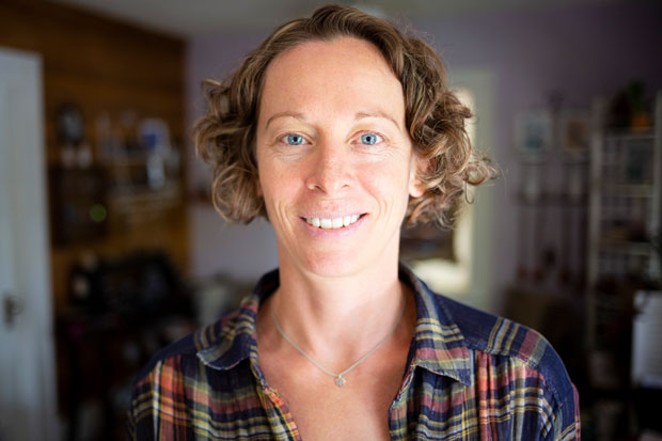Joshua Langlais is a local photographer and the creator of A Community Thread, a project for which he interviews folks on the subject of community, its importance, and how we function as individuals within it.
This is an excerpt from his interview with Shanti O'Connor in September. While O'Connor doesn't particularly enjoy describing herself, she does identify as a mom, a wife, an athlete, and a curious, interesting and weird individual.
A Community Thread: What concerns you about the state of the world and humanity?
Shanti O'Connor: I think what concerns me the most—and it's personal, but it's also collective—is relationships and how people treat other people. But specifically, what I'm super concerned about is how parents are treating and raising children. My concern about that is personal because I was raised by a drug addict who was really violent and we were homeless and my life was very unpredictable and scary all the time. And so, it's a heightened awareness that I have in our community and the collective and it concerns me because there are a lot of children being raised and being hurt.
And, as we know, how you were raised has a direct impact on how you feel and how you show up in community and what you're able to do and your health and your longevity and the relationships that you have. It affects everything. And so, on the very simplest level, how we birth our children matters and how we raise our children matters.
ACT: Why are we having such a difficult time considering everybody's needs and differences and equality and equity and embracing compassion and empathy?
SO: How we are raised directly impacts how we're able to show up in community; how we're able to have relationships. But it even goes back further than that. What we know about being in utero is that your mom's trauma, your grandma's trauma, your great grandma's trauma is all being sent down and you are adopting the trauma of the matrilineal line—not the masculine, but the feminine line. We're being born and some of us have high anxiety, depression. A lot of it's not ours. It's probably our great grandma's, who was in a war. So, collectively, we are seeing that everywhere. People are so disconnected from their self. And they are so scared. What I know to be true just in the little work that I do, the majority of people are highly anxious, are really scared, and don't know how to make any change or impact in their life. If we look at that collectively, you can see that.
I know for sure that the problem is trauma. The problem is what's happening generation after generation; it's building up. And so, our baseline of normal has moved up 10 notches to fear, stress, anxiety. We're not even born with a baseline of normal. Some of us are. Some of us are so blessed. And I also know from my own experience that we can learn. We can heal. And we can learn how to be with ourselves. And we can learn how to be in a relationship that's healthy. It can take a long time. It took me a good 20 years to get there, but I feel like I'm arriving. And how I show up now in community is profoundly different. I feel a comfortableness. I feel a worthiness. For a long time, I didn't feel worthy of any sort of goodness. I didn't feel worthy of anything. And so now I feel worthy. Now I feel like I can allow myself to be heard, to be seen. I was invisible for so long in my life. Like, literally, people would run into me all the time. I felt invisible and it seemed like I was invisible. Honestly, from my personal perspective, that's a huge part of it right there.
ACT: How do we raise awareness in a broader and further-reaching way?
SO: We need to start having more uncomfortable conversations. We haven't learned those communication skills of how to say those things. Non-violent communication kind of helps. How do we learn to even have those really simple, charged conversations without making it personal? But, that's the way. We have to expose our shadow. We have to talk about our shadow. We have to let our shadow be seen. It is one of the most important things community has to do. Because through that chaos is liberation and real connection.
Read or listen to the entire interview at acommunitythread.com.








